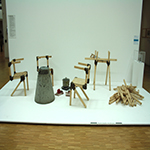Euroacademia Conferences
 Europe Inside-Out: Europe and Europeanness Exposed to Plural Observers (9th Edition) April 24 - 25, 2020
Europe Inside-Out: Europe and Europeanness Exposed to Plural Observers (9th Edition) April 24 - 25, 2020 Identities and Identifications: Politicized Uses of Collective Identities (9th Edition) June 12 - 13, 2020
Identities and Identifications: Politicized Uses of Collective Identities (9th Edition) June 12 - 13, 2020 8th Forum of Critical Studies: Asking Big Questions Again January 24 - 25, 2020
8th Forum of Critical Studies: Asking Big Questions Again January 24 - 25, 2020 Re-Inventing Eastern Europe (7th Edition) December 13 - 14, 2019
Re-Inventing Eastern Europe (7th Edition) December 13 - 14, 2019 The European Union and the Politicization of Europe (8th Edition) October 25 - 26, 2019
The European Union and the Politicization of Europe (8th Edition) October 25 - 26, 2019 Identities and Identifications: Politicized Uses of Collective Identities (8th Edition) June 28 - 29, 2019
Identities and Identifications: Politicized Uses of Collective Identities (8th Edition) June 28 - 29, 2019 The European Union and the Politicization of Europe (7th Edition) January 25 - 26, 2019
The European Union and the Politicization of Europe (7th Edition) January 25 - 26, 2019 7th Forum of Critical Studies: Asking Big Questions Again November 23 - 24, 2018
7th Forum of Critical Studies: Asking Big Questions Again November 23 - 24, 2018 Europe Inside-Out: Europe and Europeanness Exposed to Plural Observers (8th Edition) September 28 - 30, 2018
Europe Inside-Out: Europe and Europeanness Exposed to Plural Observers (8th Edition) September 28 - 30, 2018 Identities and Identifications: Politicized Uses of Collective Identities (7th Edition) June 14 - 15, 2018
Identities and Identifications: Politicized Uses of Collective Identities (7th Edition) June 14 - 15, 2018
Theatre Stage Design as the Hyperrealistic Social Imitation
-
-

-
Presentation speakers
- Peter Mazalan, Faculty of Architecture of Slovak University of Technology in Bratislava, Slovakia
- Download presentation
Abstract:
Since the second half of the 20th century theatre has started to use completely different form of its expression tools. Mostly in German theatre society critics have started to use a term that refers to this new practice as „Regietheater“ ‘director ́s theatre’. In these new directing tendencies of drama interpretation, intensions of all or most of the original authors changed or became re-interpreted. This means displacement of various structures of the story; starting with geographical location and history period and ending with the relationships‘ patterns. Theatre and opera especially as the most comprehensive artistic form have had always the biggest power and potential to discuss the most delicate and complicated political issues. Giuseppe Verdi or Richard Wagner are only two amongst other geniuses whose works have been used as important instruments to regimes or politicians in diverse aesthetical narratives. Music or story can be timeless, especially in the period of the 21st century, the century of most lively visualization. One of the ways to make the product more attractive and appealing, maybe deeper for us forming new questions and platforms for dialogue and understanding between different cultures is to transform theatre reality into the local portrait, visual frame that brings drama to the new dimensions. One of the biggest directors and scenographers in this field, Anna Viebrock, started to quote existing places, architecture and interiors connected mostly to the former Eastern Germany. With her usage of scenic space in various theatres across Europe, interesting questions and connotations are raised. This tendency is described as hyperrealistic social imitation. Where does this performing strategy have its own borders? How and when we could use „local architectural medium“ to discuss another „local“ stories not only as dramaturgical plan of theatres but as the dramaturgy of today’s Europe?
-
Related Presentations

Through Art to Good Diplomatic Relations: Exhibitions of Soviet Art in Germany, Italy and the US in the 1920s
- Marija Podzorova

















